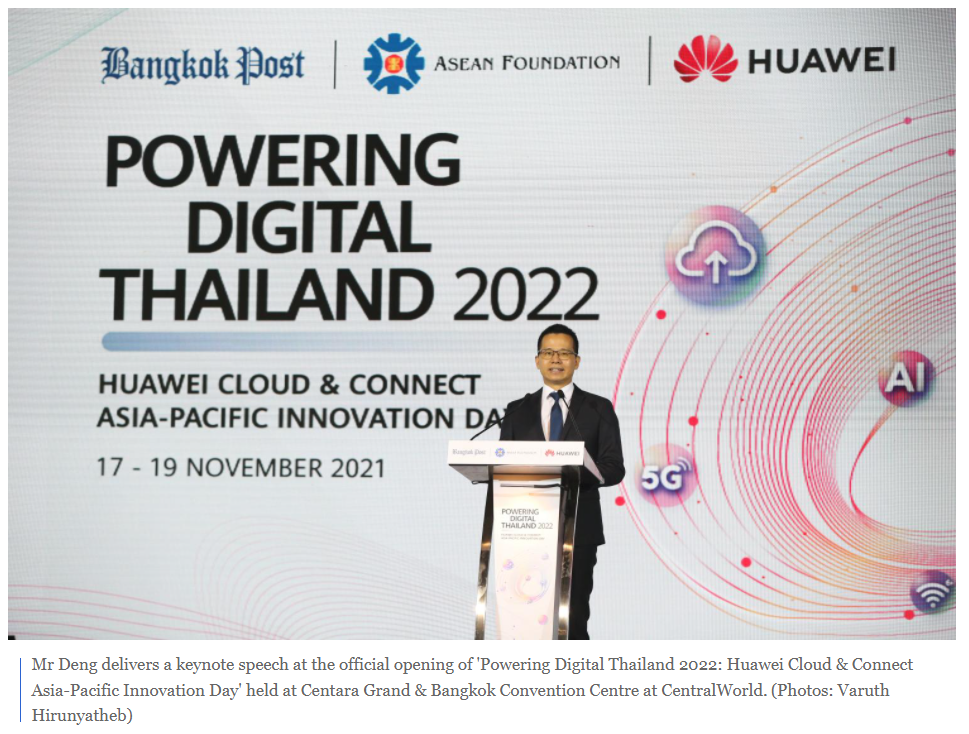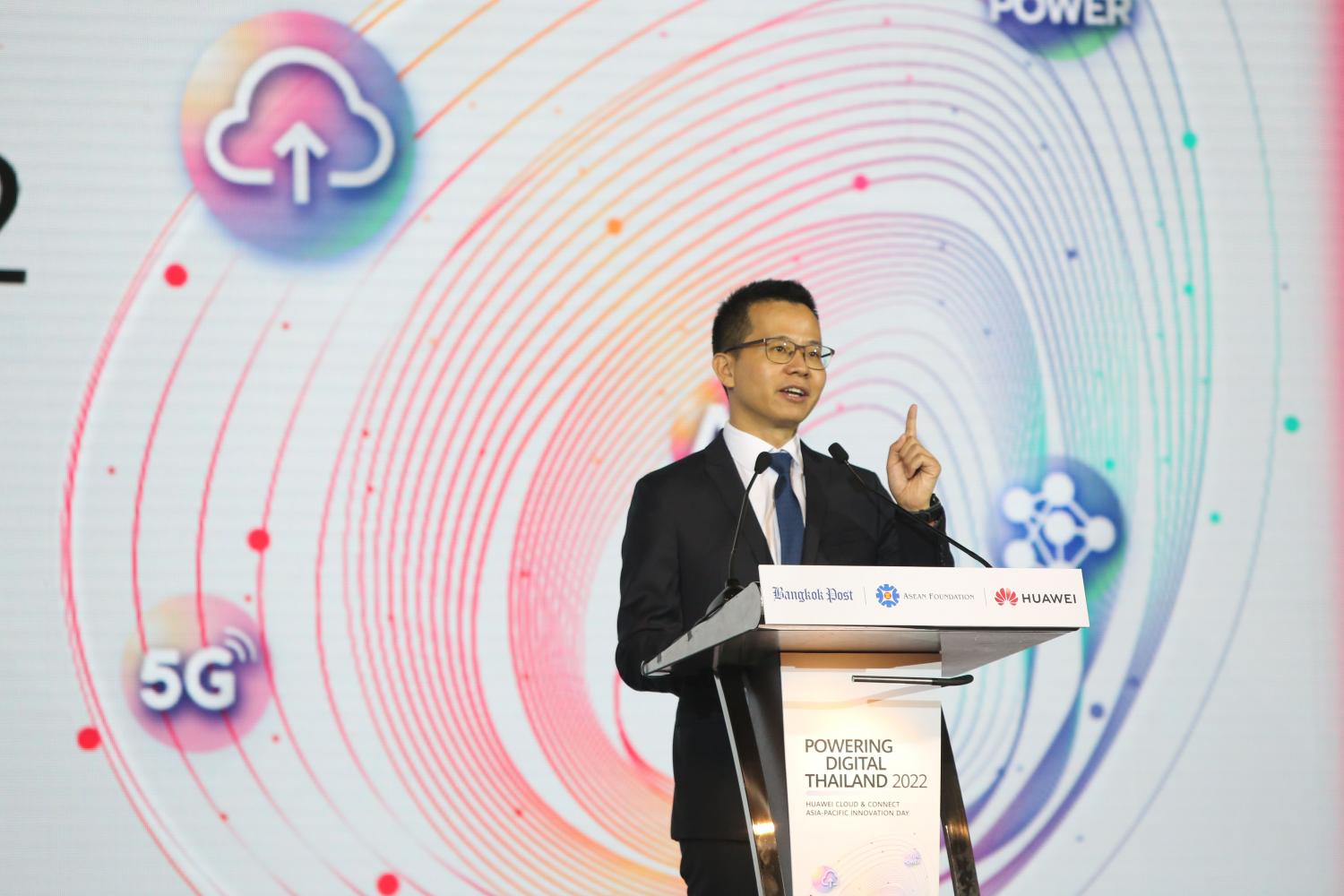Thailand: Digitalisation to drive low-carbon leadership
Thailand is expected to become Asean’s low-carbon leader, driven by a digitalisation journey through the support of the country’s innovation infrastructure, according to global tech giant Huawei Technologies.
To drive the so-called low-carbon digital Thailand approach, Huawei indicated that the country requires enrichment of 5G adoption for ubiquitous connectivity, building cloud-based digital platforms, accelerating a low-carbon transition with digital power, and cultivating digital talents and the innovation ecosystem.
The tech giant also announced that its third Huawei Local AZ data centre in Thailand is now in service.
These views were shared on Wednesday by Abel Deng, chief executive of Huawei Technologies Thailand, on the first day of Powering Digital Thailand 2022 – Huawei Cloud & Connect, in conjunction with Asia-Pacific Innovation Day, which explores innovations, technologies and business opportunities.
The three-day event is being held at the Centara Grand & Bangkok Convention Centre at CentralWorld.
DIGITAL POWER
Digitalisation is not only a crucial power for economic resilience but also a potential driver for a low-carbon and sustainable society, Mr Deng said.
A strong ICT industry and digitalisation foundation are proving to be the keys to economic resilience. The sudden outbreak of Covid-19 has caused digital transformation to accelerate by 5 to 7 years globally, and 10 years in Asia-Pacific.
Digital infrastructure serves as the cornerstone of the digital economy as every 10% increase in fixed broadband penetration will boost GDP by 0.8%-2.3%, and every 10% increase in mobile broadband penetration will raise GDP by 1.5%-2.8%, according to Mr Deng.
In the near future, digital technologies including 5G, the cloud, and artificial intelligence will assume the main responsibility for driving economic growth, he said.
Like other countries, Thailand could also face various uncertainties in years to come. “In order to be better prepared, promoting economic resilience through digitalisation is an urgent mission,” Mr Deng said.
According to a World Economic Forum report, by 2030 the benefits of digitalisation will reduce global carbon emissions by 12 billion tonnes, which is 10 times the carbon emissions produced by digitalisation itself.
“We [Huawei] are very encouraged to see that Thailand is the first Asean country to commit to carbon neutrality,” said Mr Deng.
At the 2021 United Nations Climate Change Conference (COP26) earlier this month, Thailand proposed a carbon neutrality 2050 roadmap to address climate changes, which is the same as the European Union’s milestone.
Mr Deng gives a keynote speech at the official opening of “Powering Digital Thailand 2022: Huawei Cloud & Connect Asia-Pacific Innovation Day” held at Centara Grand & Bangkok Convention Centre at CentralWorld.
5G DRIVE
According to Mr Deng, Huawei proposes four layers of support to drive the low-carbon digital path.
First, Thailand needs to keep expanding 5G coverage and adoption to unleash economic value.
According to a joint forecast by the Office of the National Digital Economy and Society Commission, Time Consulting and Huawei, the 5G-powered economy will reach 2.3 trillion baht by 2035, accounting for 10% of the country’s GDP.
Thailand is now a leading 5G force in Asean, Mr Deng said. Thailand has deployed 20,000 5G stations and reached 4.3 million 5G users, which is 2.5 times the total number of 5G users in other Asean countries.
Huawei, he said, has worked with many Thai partners to launch pilot 5G projects in different industries such as healthcare and agriculture.
Secondly, Thailand is recommended to strengthen its digital platform, capitalising on Huawei Cloud.
Digital transformation has been accelerated in Thailand during the pandemic.
According to a Deloitte report, from 2020 to 2021 the ratio of Thai companies using the cloud has increased from 59% to 78%. By 2030, 87% of companies will use cloud platforms and the digital economy will account for 30% of Thailand’s GDP.
As digitalisation is being adopted around the globe, data localisation becomes a key trend, Mr Deng said.
He said Huawei Cloud is the only cloud service provider with a local data centre in the Thai market. It has more than 300 partners in Thailand and 3,500 marketplace offerings.
Last year, Huawei announced a 700-million-baht investment into a third Huawei Local AZ data centre, which is now in service, Mr Deng said.
Thirdly, Thailand needs to forge low-carbon development with digital power solutions.
“The energy transition brings massive business opportunities and it will be the largest industry in the next 30 years,” he said.
According to UBS forecasts, in the next ten years global energy transition investments will reach US$50 trillion, accounting for 40% of total investment.
In the next decade, Thailand’s energy transition is set to develop at a rapid speed, which will bring about 1% GDP growth, he said.
“Huawei fully commits to supporting Thailand to become the Asean low-carbon leader, and we are confident about achieving this goal with our technology expertise and global practices,” Mr Deng said.
Huawei Digital Power Business, which supports industries with efficient power usage solutions, is now providing services to more than 1,000 clients and partners in Thailand.
TALENT BUILDING
Finally, Thailand needs to cultivate thriving innovation and talent through a partnership ecosystem.
Mr Deng said Thailand now has three startup unicorns and more are expected to come.
This trend also brings an urgent need to invest more in digital talent cultivation.
According to Mr Deng, the total demand for digital talent in Thailand will exceed 1 million workers by 2030. And there will be a 400,000-person gap in the digital workforce supply.
Huawei will continue to build Thailand’s ecosystem platform and talent programme, he noted.
Source: https://www.bangkokpost.com/business/2217307/digitalisation-to-drive-low-carbon-leadership


 Thailand
Thailand





